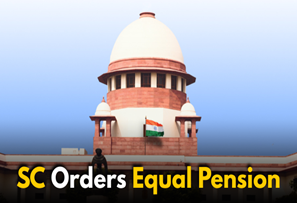SC Ensures Uniform Pension for Retired Judges
SC Ensures Uniform Pension for Retired Judges
Why in the News?
In a landmark decision that’s making waves in supreme court news today india, the Supreme Court has ruled that all retired High Court judges, irrespective of their source of appointment or tenure, are entitled to uniform pension benefits, eliminating disparities in pension payments and reinforcing the principle of One Rank One Pension. This ruling on uniform pension judges has significant implications for the judiciary.
Supreme Court’s Key Ruling:
- The Supreme Court ruled that all retired HC judges must receive uniform pension benefits.
- Distinction between permanent and additional judges termed “artificial” and unconstitutional under Article 14 (Right to Equality).
- CJI Bhushan R Gavai, along with Justices AG Masih and Justice K Vinod Chandran, delivered the verdict.
- All retired judges are now entitled to a basic pension of ₹13.5 lakh per annum, and retired Chief Justices to ₹15 lakh per annum.
-
This decision affects both existing and new judges of madras high court and other high courts across India.
Pension Criteria and Calculations
- Judges from the Bar to receive ₹96,525 per annum per completed year of service, with full pension on completing 14 years (10 years of Bar practice now counts).
- Judges from district judiciary will get full pension after 20 years of service, including special additional pension of ₹45,016 per annum per year as HC judge.
-
Court ordered refund of personal NPS contributions with dividends; state contributions will return to consolidated fund.
Reaffirming One Rank One Pension Principle
- The judgment reiterated the 2014 P. Ramakrishna Raju case that established One Rank One Pension for judges.
- Discrimination based on source of appointment or service length is patently unconstitutional.
- Applies uniformly, regardless of date of retirement or judicial background.
-
Also resolved pending gratuity and provident fund issues through suo motu proceedings.
Constitutional Provisions Related to Retired Judges in India : |
– Article 124(7): Retired Supreme Court judges cannot practice before any court or authority in India to uphold judicial independence and impartiality.
|




